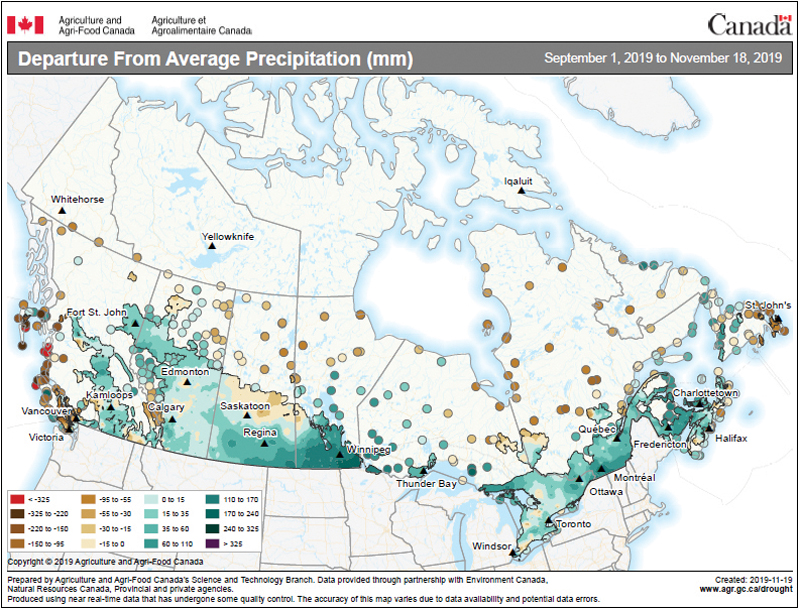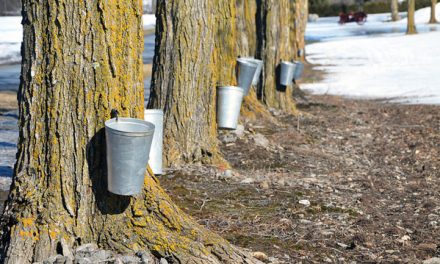Departure from average precipitation (in millimetres) from Sept. 1 to Nov. 18, 2019 (during harvest and collection), compared with annual average, by province. This map shows precipitation close to average in parts of central Saskatchewan and above average across most of the Prairies and Eastern Canada. Source: StatCan
OTTAWA – Canadian farmers reported producing more wheat, barley and oats in 2019, while canola, corn for grain and soybean production were all down from a year earlier.
The 2019 crop year was a difficult one for many farmers nationally. Heavy rain, coupled with colder than normal temperatures, made planting conditions difficult in much of Eastern Canada early in the crop year, while overly dry conditions in parts of Western Canada persisted well into the growing season. At the time of harvest, higher than average precipitation across Canada, including early snow in the Prairies, slowed the harvest for many farmers and will likely result in unharvested crops remaining on the field over the winter.
Despite delays in harvesting, farmers were asked to provide their best estimates of yield and production for all area harvested or to be harvested for the 2019/2020 crop year.
Corn for grain
Nationally, farmers reported that corn for grain production fell 3.5 per cent to 13.4 million tonnes in 2019. The decrease stemmed from lower yields, which fell 4.8 per cent to 147.2 bushels per acre. The decline was partially offset by a 1.4 per cent increase in harvested area. Corn production was likely affected by cold and wet conditions during the spring, which delayed planting, as well as dry conditions throughout the growing season and poor weather during harvest in Ontario and Quebec, where approximately 85 per cent of the corn in Canada is grown.
Ontario farmers reported that harvested area increased 3.2 per cent to 2.1 million acres in 2019. The increase in area was offset by lower yields, which fell 4.6 per cent to 158.4 bushels per acre, bringing production down 1.5 per cent from 2018 to 8.6 million tonnes.
Farmers in Quebec reported that harvested area edged down 1.0 per cent to 938,000 acres in 2019. Despite the relatively stable acreage, yields fell 6.0 per cent to 141.4 bushels per acre, contributing to a 6.9 per cent decrease in production to 3.4 million tonnes.
Soybeans
On a national scale, soybean production fell 18.5 per cent to 6.0 million tonnes in 2019. The decrease was attributable to lower harvested area (down 10.6 per cent to 5.6 million acres) and yields (down 8.8 per cent to 39.6 bushels per acre). Poor weather conditions throughout the major soybean-producing provinces likely contributed to the decrease in yields from a year earlier.
Harvested area in Ontario increased 2.8 per cent to 3.1 million acres in 2019. Despite higher harvested area, farmers reported that yields fell 7.3 bushels per acre to 44.1 bushels per acre, bringing production down 11.7 per cent to 3.7 million tonnes.
Farmers in Quebec reported that yields fell 9.2 per cent to 42.6 bushels per acre in 2019. Harvested acres were down 1.1 per cent to 903,100 acres. As a result, soybean production was down 10.1 per cent to 1.0 million tonnes.
Farmers in Manitoba reported a lower harvested area for the second consecutive year, down 24.5 per cent to 1.4 million acres in 2019. Yields fell 14.1 per cent to 29.2 bushels per acre, bringing production down 35.2 per cent from 2018 to 1.1 million tonnes – the lowest level in the province since 2014.
Barley and oats
Nationally, farmers reported that barley production rose 23.9 per cent to 10.4 million tonnes in 2019. Harvested area was up 13.9 per cent to 6.7 million acres, while yields rose 8.9 per cent to 70.8 bushels per acre.
Farmers reported that oat production rose 21.0 per cent to 4.2 million tonnes in 2019. The increase in oat production was driven by higher yields (up 4.9 per cent to 94.1 bushels per acre) and harvested area (up 15.4 per cent to 2.9 million acres).
Wheat
From 2018 to 2019, total wheat production rose 0.5 per cent to 32.3 million tonnes, driven by higher yields. Yields were up 2.7 per cent to 49.8 bushels per acre. However, harvested area decreased 2.3 per cent to 23.9 million acres.
In Saskatchewan, wheat farmers reported that yields rose 5.0 per cent to 44.4 bushels per acre, while harvested area decreased 2.1 per cent to 12.5 million acres. Wheat production in Saskatchewan rose 2.7 per cent to 15.1 million tonnes.
Wheat farmers in Alberta reported that production rose 2.6 per cent to 10.3 million tonnes, driven by higher yields, up 5.2 per cent to 52.3 bushels per acre. Meanwhile, harvested area decreased 2.5 per cent to 7.2 million acres.
Manitoba farmers reported that yields fell 1.8 per cent to 59.8 bushels per acre in 2019. Despite the decrease in yields, harvested area rose 5.7 per cent to 3.1 million acres, resulting in a 3.7 per cent production increase to 5.0 million tonnes.
Canola
Canola production decreased 8.3 per cent nationally to 18.6 million tonnes in 2019 – its lowest level since 2015. Lower production was largely attributable to lower harvested area, which fell 8.8 per cent year over year to 20.6 million acres. Despite a dry start to the growing season in parts of Western Canada and poor conditions throughout the Prairies during the harvest, yields rose 0.5 per cent to 40.0 bushels per acre.
Saskatchewan, Canada’s largest canola-producing province, led the decrease with farmers reporting a 7.3 per cent drop in production to 10.1 million tonnes. This decrease was attributable to lower harvested area, which declined 7.1 per cent to 11.4 million acres. Yields were unchanged from 2018, at 39.3 bushels per acre.
Farmers in Alberta reported that canola yields rose 3.9 per cent to 40.3 bushels per acre in 2019. Despite the increase in yield, harvested area fell 12.9 per cent to 5.8 million acres, bringing total production down 9.4 per cent to 5.3 million tonnes.
Harvested area in Manitoba declined 5.0 per cent to 3.2 million acres in 2019, while yields fell 3.0 per cent to 42.0 bushels per acre. As a result, canola production in the province was down 7.9 per cent to 3.1 million tonnes in 2019.
The November Farm Survey of field crop production covering approximately 26,800 Canadian farms was conducted from Oct. 9 to Nov. 17, 2019. Farmers were asked to report their estimated seeded and harvested areas, yield, and production of grains, oilseeds and special crops. This survey collected data from every province. This release provides the final production estimates for 2019.
The Crop Condition Assessment Program website at www.statcan.gc.ca, is an additional tool to assess the growing conditions of field crops during the crop year. Users can monitor a vegetation index of crop land on a weekly basis. “Crop Reporting Survey at a Glance,” an easy-to-print chart that provides an overview of the survey cycle, is now available from StatCan.













